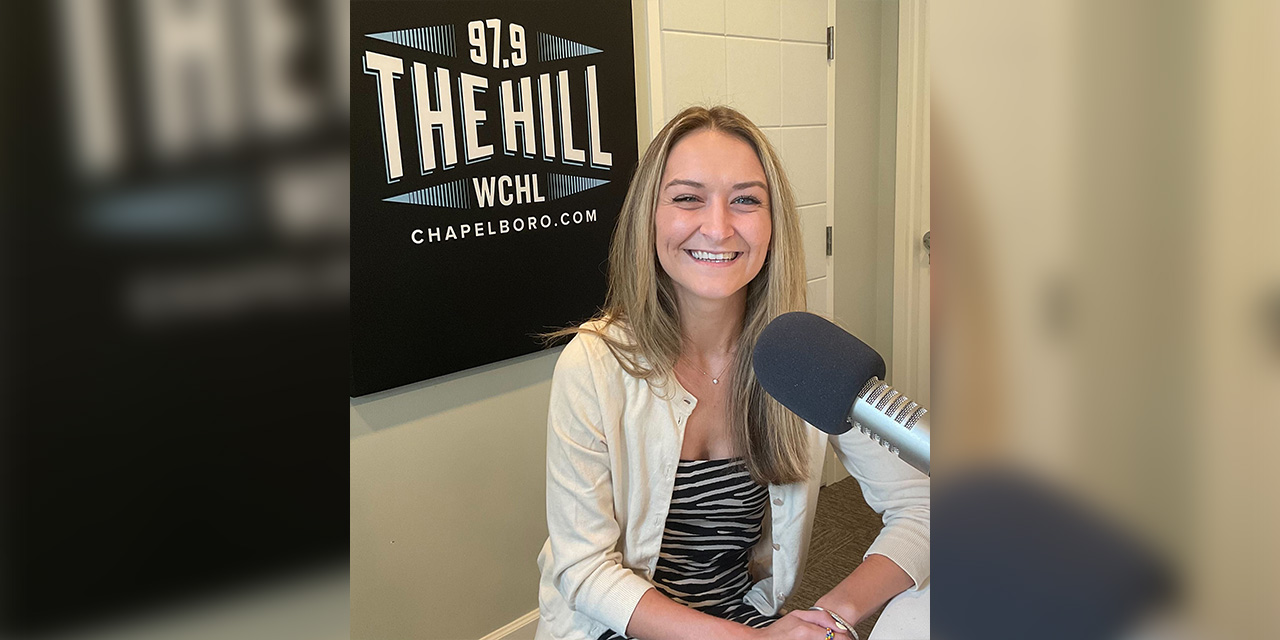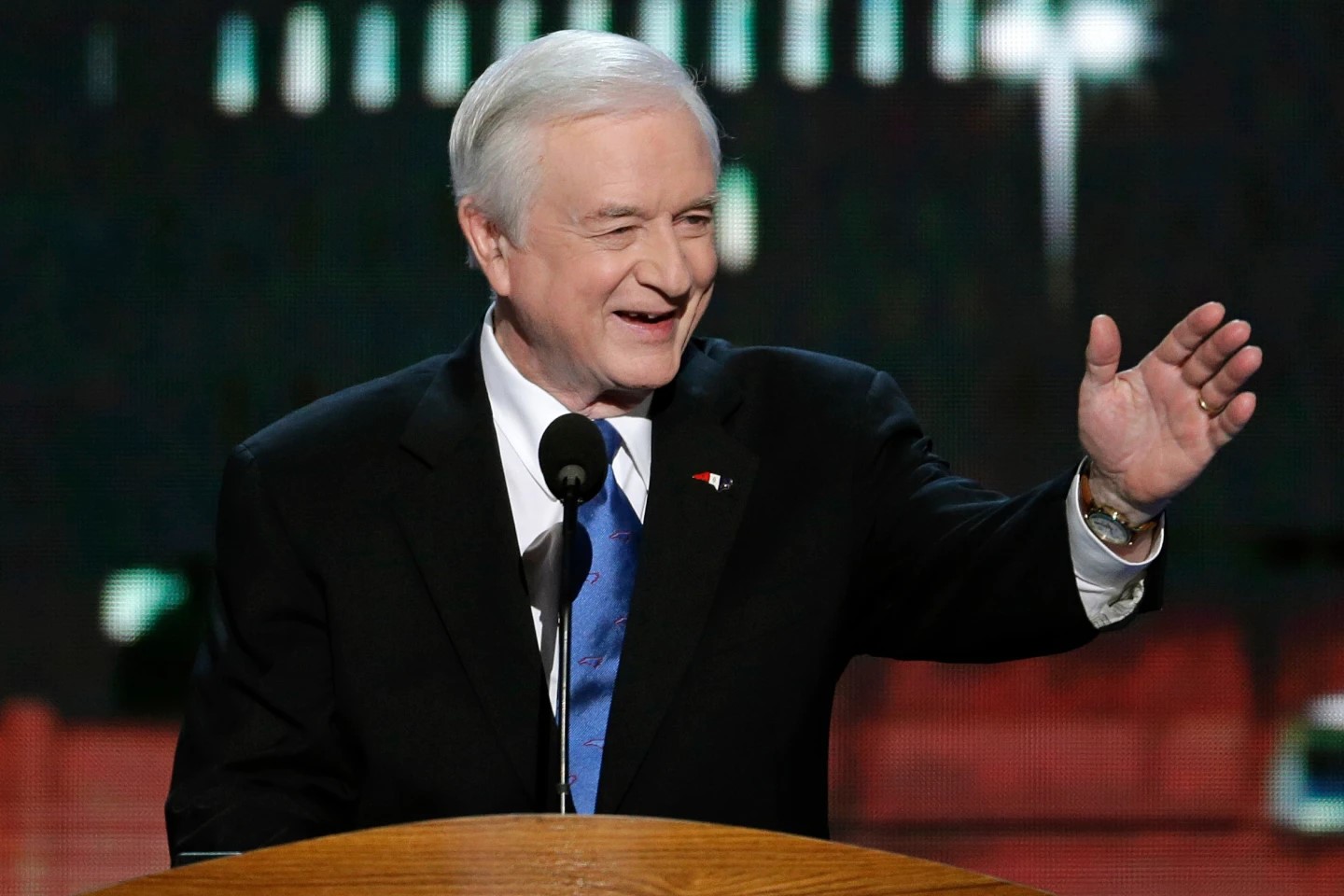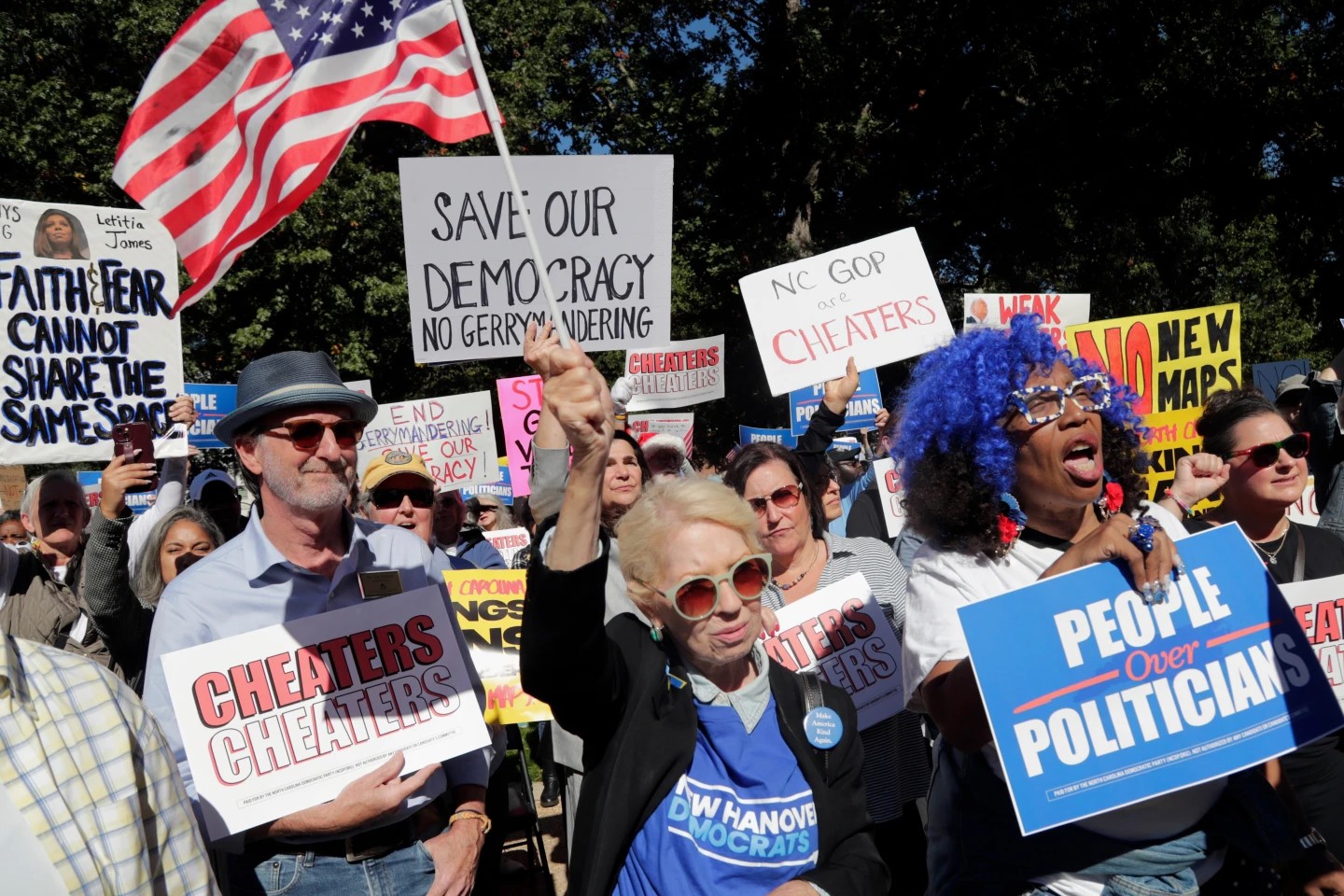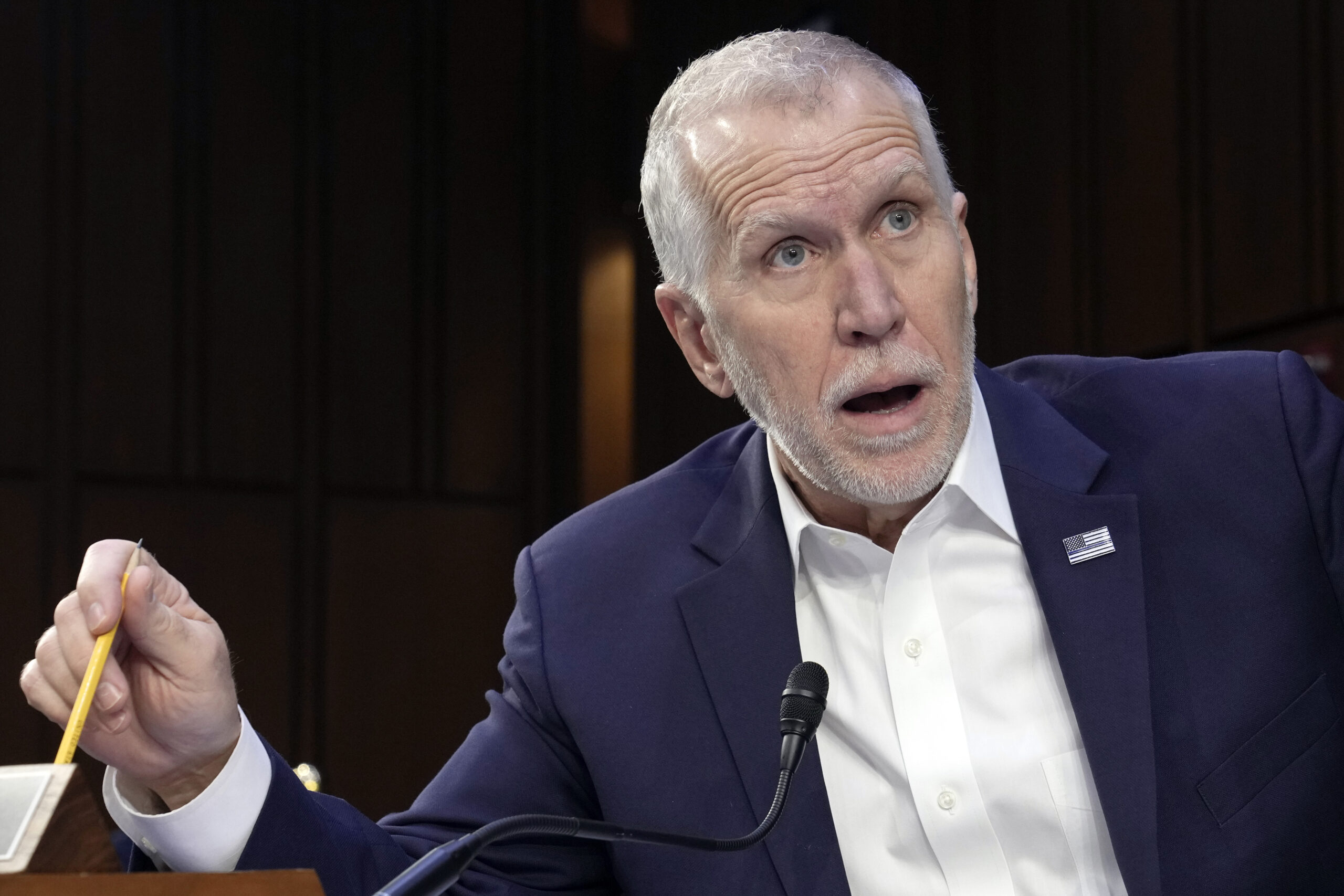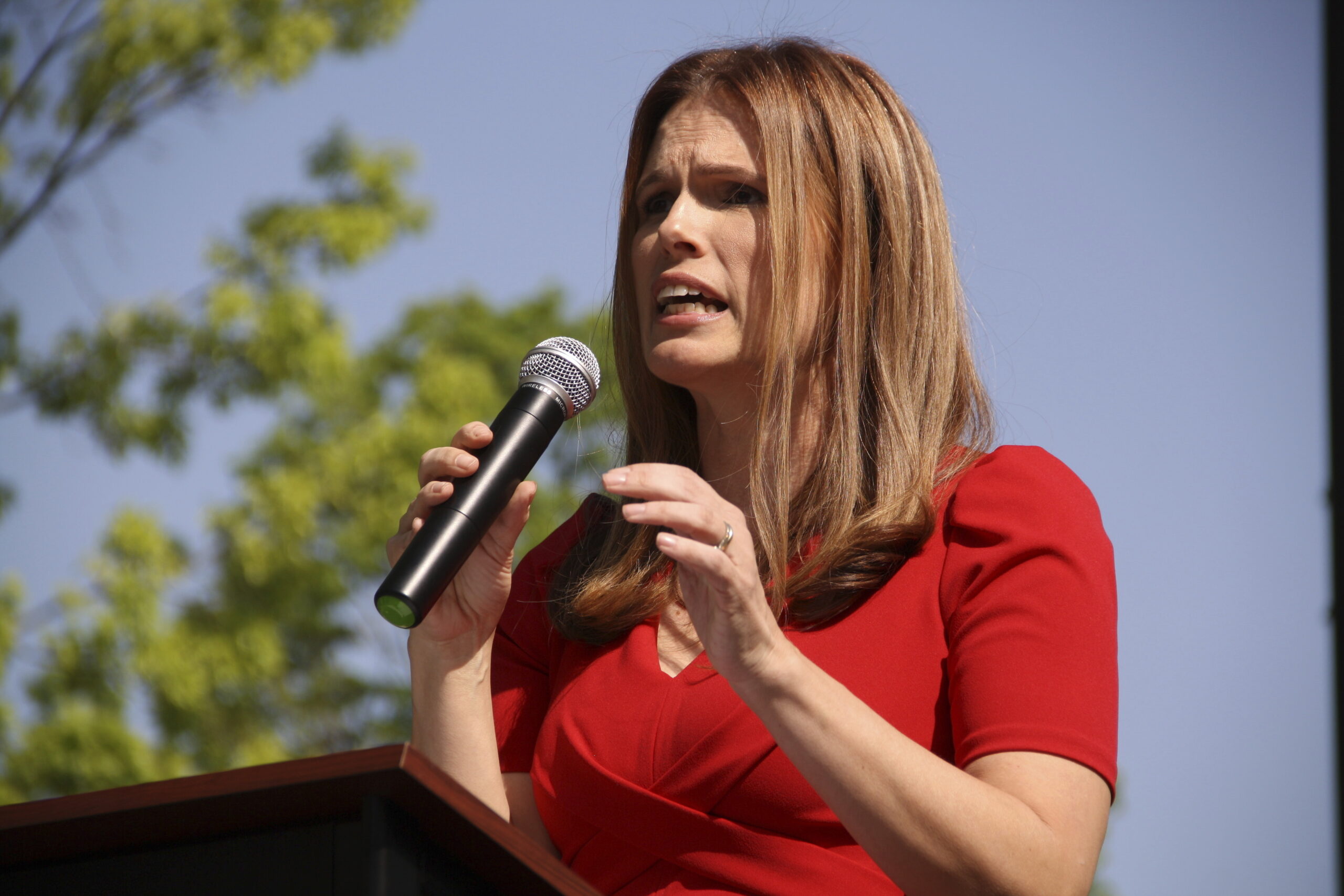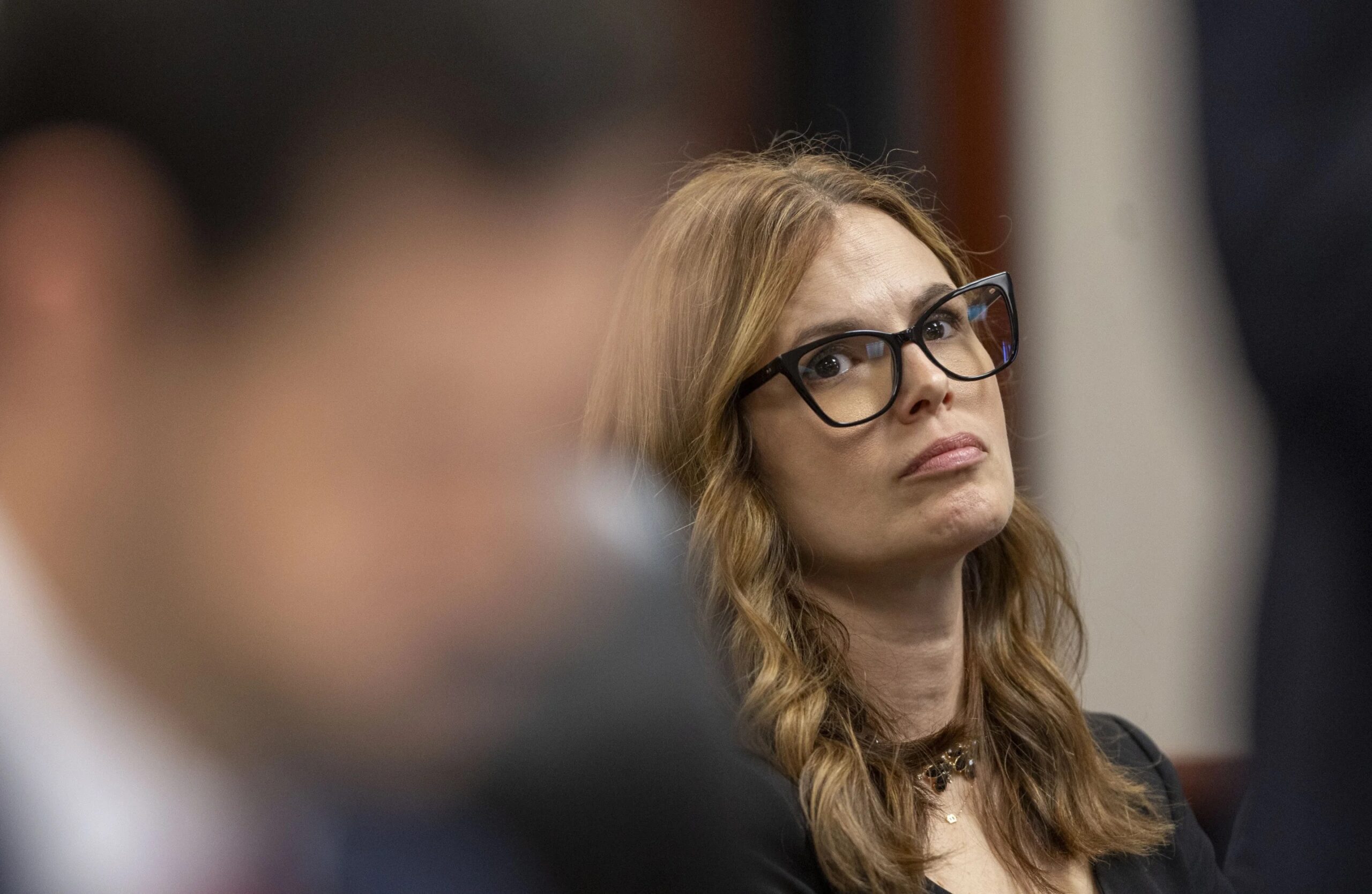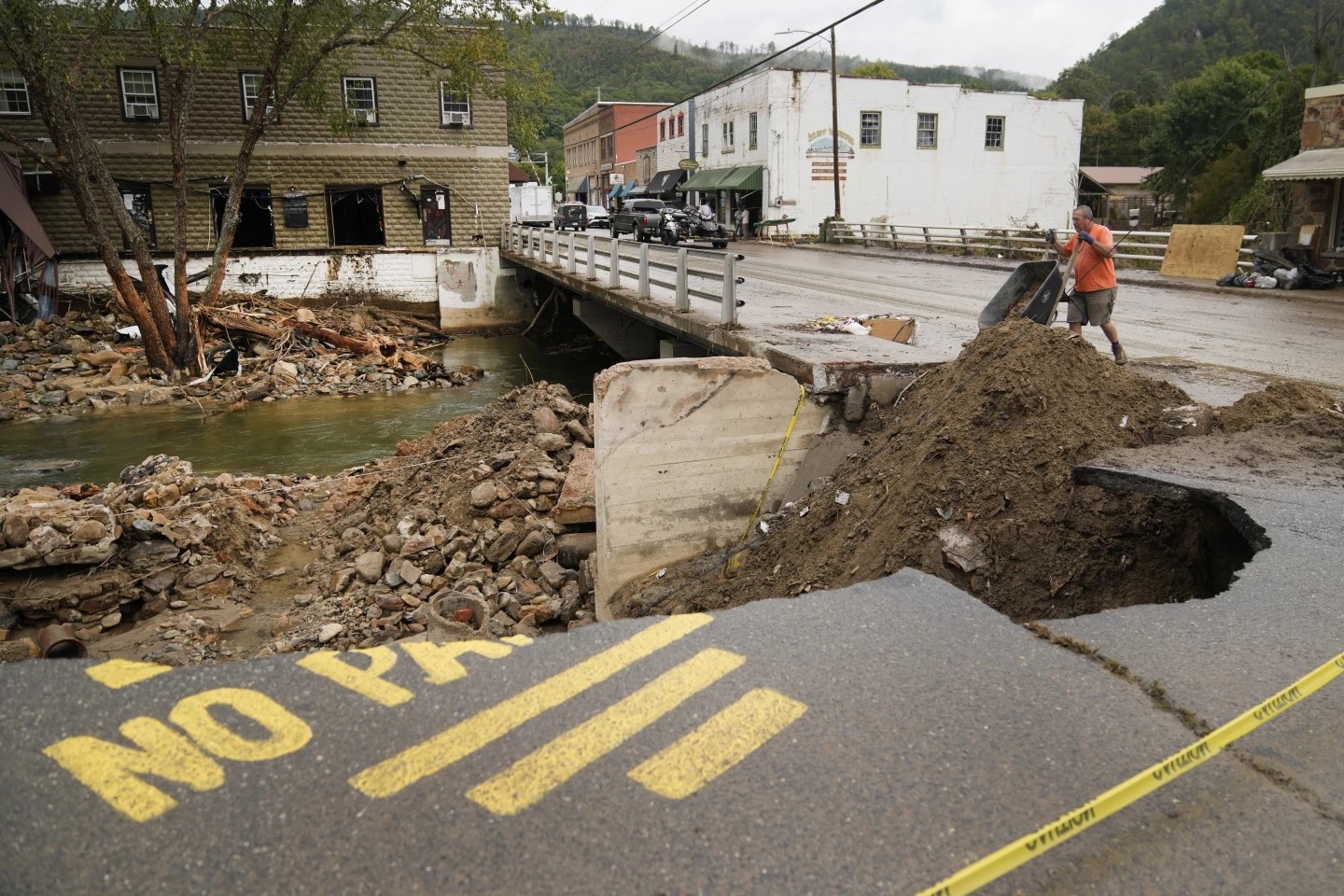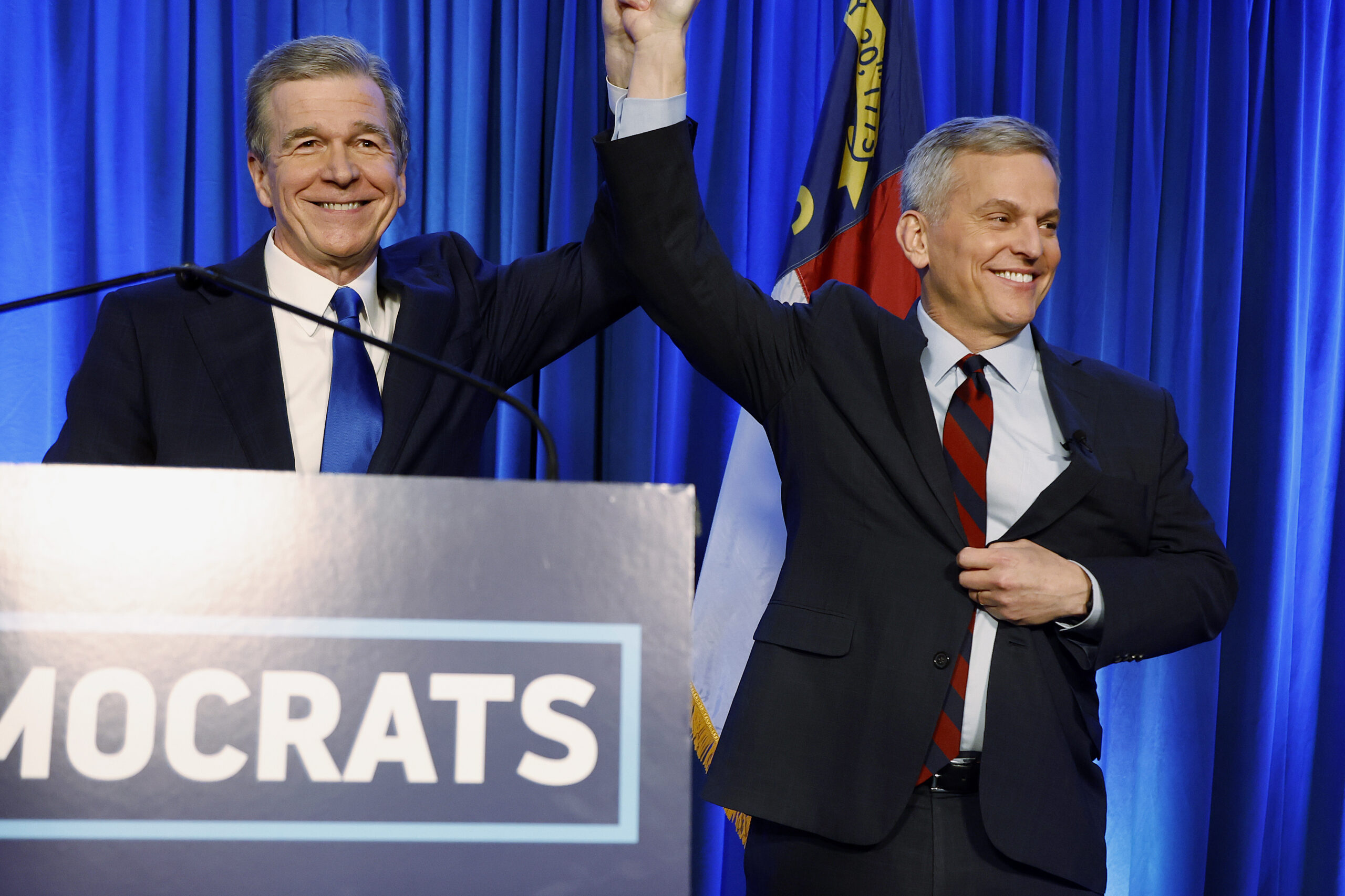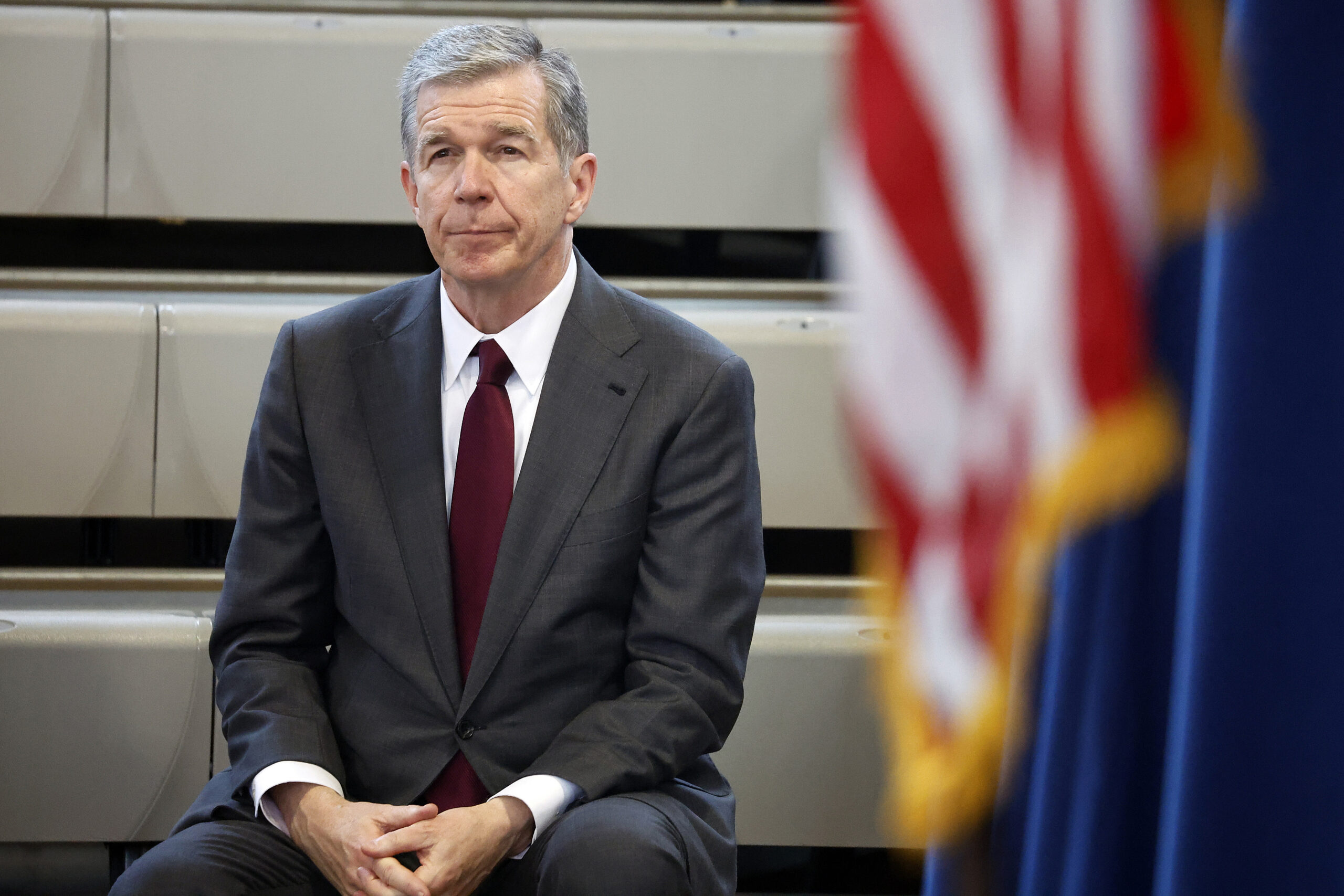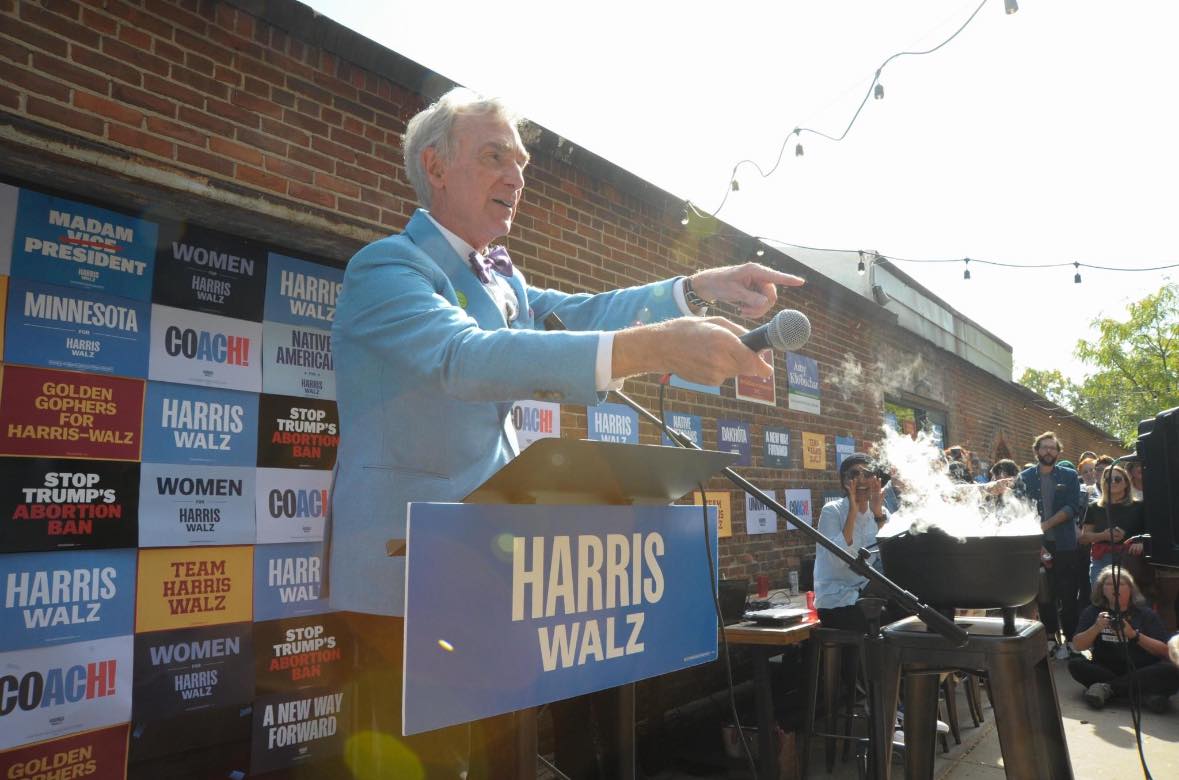With summer coming to a close, the efforts in the fall statewide and national election cycle are kicking into high gear. North Carolina is once again seen as a battleground state, with a tight gubernatorial race and parties vying to either break or maintain a super majority in the state legislature. And that’s not including the national implications with representation in Congress and the electoral votes contributed to the presidential race.
Leading the charge for the North Carolina Democratic Party in the fall election cycle is Anderson Clayton, who is going through a statewide and federal election cycle for the first time since being elected as chair in 2023. The youngest state party chair in the U.S., the 26-year-old is working to see Democrats rebound after losing ground in the General Assembly and a majority on the N.C. Supreme Court in 2022. To do that, Clayton is aiming to educate voters on more than just the national talking points and races that dominate each even-year cycle, and recruiting candidates she believes will energize voters.
Clayton joined 97.9 The Hill on the air Friday, August 9 to discuss the election cycle and her party’s strategies in the state. Below is a transcript of her interview with 97.9 The Hill News Director Brighton McConnell, which has been lightly edited for clarity and brevity. The full conversation can be listened back to here.
Brighton McConnell: We had you on about a year ago, a few months after you had just taken the position of chair of the state Democratic Party. Since then, there’s been a lot that’s happened! You talked last time about how your goal is to try and make the party from the ground up, focusing on the local government cycles and making sure that there are Democratic candidates for those cycles. I’m curious to how you think that the local election cycle went during your the first year on the job — and beyond kind of settling into the position, how have you been able to shape the role of chair for what you want the state Democratic party to be?
Anderson Clayton: Well, I think it’s a building process, to be honest. In 2023, the North Carolina Democratic Party saw historic wins in counties and communities across the state, places that we hadn’t really had a Democratic representative before. Looking at little places like Cooleemee in Davie County that’s now got a Democratic mayor, and New Hanover County — one of our bellwether counties for the Democratic Party — has got a Democratic city council, and school board, and the opportunity for us to really take back races that we hadn’t participated in for a long time. I think for a lot of folks, it was looking at those small races as the building blocks to get to 2024, and that’s really what the party prioritized in that election year. In September of 2023, we were able to put three organizers on the ground — it’s now five for the state party with an organizing director. That was always a really big goal of ours: to start the organizing program early in the state. So, we were successful in doing that. The buildup that we had had from these just great [municipal race] wins… you know, you look at neighboring Alamance County, who unfortunately had a loss in Ricky Hurtado in the 2022 elections by less than 500 votes. That county party was just really demoralized after that — and what they had come back in 2023 was Dejuana Bigelow, who was the first Black woman to get on the Burlington City Council in Alamance. It sort of gave people this energy wave again that [said], ‘Oh, Democrats can win in places that we haven’t been in before and maybe we just need to put the boots on the ground, [get] the energy directed towards those races.’
So, that was 2023… 2024 has been a lot of momentum grabs. At the end of 2023, we also had historic waves with the amount of people we had sign up to run for state House and Senate races. Democrats this year are contesting 168 out of 170 state House and Senate seats. That’s something we’ve not done since 2018, which is the first time that we broke the supermajority in the General Assembly. The buildup has really looked like recruiting really good, talented candidates. I talk about Steve Luking a lot because I think he’s a great one that not a lot of people know about — but Phil Berger, who’s our Republican senate majority leader, had gone uncontested for the last two, three election cycles in the state. And this year, he’s got Dr. Steve Luking running against him, who’s from Reedsville. He’s a family physician who just retired this last year, and somebody who is gonna be going up against Phil Berger this year who has had patients that have not been able to get good healthcare access because [Berger was] denying Medicaid expansion in the state.
And so, recruitment efforts for the party have gone strong and they are, I think, hitting the ground running across North Carolina. The 74,000 votes that we lost by statewide and nationally for Joe Biden in 2020, I’m hoping are going be made up on the margins by those people that are campaigning and getting out in places where the party’s not had a voice in before. So, I think things are going okay, but you never know. We’ve got to keep running this race like we’re seven points down — because Democrats are in North Carolina right now.
McConnell: Well, back to what you were talking about a year ago… again, that strategy of getting support from the ground up, thinking about it on the local level, making sure that those races are contested, is about making sure that people are out there show an example and make people understand that the Democratic Party is trying in these areas. And eventually, you hope that the policies will play out and be a great example to folks of, ‘Here’s what they can do if they continue to rise up the political ladder.’ Right?
Clayton: Yeah, and it’s not just about waiting for the policies to take hold. It’s actually talking about the policy. I was in Cherokee County out in, you know, red rural North Carolina where people are like, ‘Democrats ain’t out there, are they?’ They are, and they’re in Andrews, to be precise. And I was talking with folks, I said, ‘Do you know that Andrews, North Carolina got $17 million from the American Rescue Plan Act to fix the sewer system in this tiny little city, in this county that is in the far western part of the state?’ And everybody in there, every Democrat in there dropped their mouths open. They said, ‘What do you mean? We’ve got no idea that this is happening.’ I’m like, ‘Yeah, because locally elected Republicans are probably not gonna tell you, right? Your state House and Senate reps that are Republicans are not going to tell you where this money came from. But somebody out here has got to, and we Democrats have got to be owning that, right?’ The opportunity that our party has been giving us, this administration has given us, is [the chance] to say, ‘We’re the only party that’s investing in rural North Carolina right now.’ We’re the only party that’s investing in rural America right now, quite frankly, with us trying to revitalize rural economies. I think that’s something where the information silos, and the lack of media in these communities, has given so much ammo to [arguing otherwise] — and I just feel like we’ve had to get out there, and actually speak and educate our people on what Democrats are doing well.
And that’s not to say we’ve gotten everywhere yet, because I’ve got a lot of rural counties I still need to get to. But everywhere we go, we’re talking about the number of people in that county that got healthcare for the first time because of Democrats in the state legislature this past year. We’re talking about the number of dollars from public schools that are going to be taken out of that county’s public school budget because of private school vouchers that Republicans have instituted this last year. And we’re talking about Democrats giving millions of dollars to these counties through the American Rescue Plan Act and also the bipartisan infrastructure bill funding that they’ve not even seen yet. That has not even touched the ground yet in North Carolina. So… we got a lot to talk about, I think, as a party and we just have got to start doing it better.
McConnell: You mentioned the Biden-Harris administration. Let’s turn to what has been the talking point across the nation for the last few weeks: it’s big time of change for the party right at the top of the presidential ticket with that swap from President Biden to Harris as the nominee. From when you’ve been talking with your contacts here and with constituents… is the excitement we’re seeing on social media and at these rallies, is it real, is it widespread? We’ve seen the fundraising, but how is it manifesting from what you’ve seen?
Clayton: I’m gonna give a shout out to our college Democrats president at Appalachian State. He texted me the other day and he was like, ‘Anderson, if the energy that I’m feeling in Watauga County is the energy that we’re seeing all across the state, we’re gonna win this year. We’re gonna win big this year.’ I feel like it’s not just the ‘Twitter’s not real life’ type of energy — that is true, but I think the excitement that everybody’s feeling [is because] people didn’t expected Democrats to do this. I’ve seen so many young people make the joke of, ‘Wow, the Democratic party’s actually an array. We’re doing things right now, right?’ We’re picking exciting people to be vice president. We’re doing things that I think [show we are] listening to the base and the American people.
I credit the president — the heaviness of making that decision and choosing to step down and the ability to say he’s doing what he’s always done, which is listen to the American people. That’s something that I hope people took to heart, and we’re seeing it. North Carolina had over 10,000 people sign up to volunteer within the last two weeks for this campaign. It was one of, if not the most, out of any battleground states in the country. I feel it in the sense of people keep comparing it to 2008, and I’m like, ‘I’m only 26. A lot of us were not like politically active during Barack Obama’s runs’ or like, we were young, but we were not engaged enough with politics to really understand what that energy felt like. I think for us…I’ve heard a lot of young people be like, ‘This is our Barack Obama era. This is our chance to give that sort of representation back.’
McConnell: You’ve posted about having your own interactions with the vice president even before this announcement was made. I’m curious what you’ve gathered just in your own experience about Harris’ people skills, leadership, etc.?
Clayton: I worked for her in 2019 when I was a little caucus organizer. If you’re going to work in the Iowa caucuses, it’s usually because you know someone, and that’s how you get a job on a campaign like that originally. And I got a job through Kamala Harris’ website. I applied online as this little girl from rural North Carolina, and I was just sitting there thinking, ‘There is no chance in hell that I will ever end up doing something like this.’ And that campaign, I think, searched for people that were maybe not the typical people that you would find on national campaigns at that point. So, I got plucked to go out there and work. But I chose her because I wanted to see a Black woman become president of the United States.
Kamala Harris had a record of not just being someone good in the representational politics aspect, but also just someone that [would use her experience.] Like when she took on Brett Kavanaugh when he was being appointed to the Supreme Court for the first time, and [she was] really going after him on his record. I think that people have not yet seen the prosecutorial Kamala Harris that I think we are going to see in this election cycle. That’s what I’m excited for, because I worked for her and I think she’s a boss. I just think like we have yet to really see what it’s like to see a woman in a position of power. I think the fundraising… the reason why that’s so important to me is that… I became the youngest state party chair and everybody looked at me and they said, ‘There’s no way that you’ll be able to raise money because like on top of that [age difference], you’re a woman.’ She has just blown that stereotype out of the water. And I hope to God that people never look at women who decide that they want to run for office again and be like, ‘Well, you won’t be able to fundraise. You can’t do this.’ I think she’s inspired more people to consider themselves in positions like this too.
McConnell: I definitely think that’s a huge part of that excitement. It’s not just something different from what we all were expecting and had targeted for four years being the presidential election again and feeling like the future of the country is at stake again, but it’s different because it’s just a different type of candidate in this position that we’ve seen before. And, you know, it’s a big reason why her becoming vice president was a big deal at the time as well, because now she’s able to step in, you know, again, unusual circumstances to where she ends up at the top of the presidential ticket, but she’s able to step in and reap the benefits of having been able to be in that position for four years.
Clayton: But people were also sort of like, ‘Why Kamala?’ There was that whole debate — a quick one, right? It’s not just because she was the vice president, and it’s not just because she would be the first Black woman president that it should be her [as the nominee.] To me, the way that this woman campaigned the first time she ever ran for district attorney… she was counted out that entire election. No one thought she would win. And this woman sat outside of bus stops at 6:00 AM when people were on their morning commutes to go to work, and she talked to them about an election that none of them had ever voted into their lives. She took an ironing board and sat outside of grocery stores where people were getting off work, talking to them about an election cycle. This is someone that knows how to campaign and meet working people where they are. I think we’re gonna see a different sort of presidential campaign even over the next three months, right? Which, like, if we had given her an entire year, who knows what she would’ve come up with, right? I think she’s a hustler when it comes to being able to be aggressive in campaigning and working to win people’s votes. And that’s something that we need right now — we need the energy, we need the momentum, but we need someone that is hungry to fight for the American people.
McConnell: Let’s turn back to specifically your neck of the woods, and that is North Carolina. Looking ahead, we know the bigger policy points the Democratic Party are pushing for this fall’s elections. How are you not only using those policies to shape your strategies in terms of getting out and talking with voters? And what are some policy elements that are not talked about as much compared to the ones that we hear on the national scale?
Clayton: I hear a lot of people in North Carolina say, ‘Voters are still talking about kitchen table issues.’ And I’m like, ‘Alright, well, let’s look at the ballot and let’s look at what issues are kitchen table issues that don’t actually deal with the presidential level, or even the gubernatorial level.’ Maybe let’s look at the Council of State races right now, and that many people in North Carolina have absolutely no idea who they are or what they do. Looking at a Commissioner of Insurance race right now, in particular… If you’re a homeowner in North Carolina and you’ve had an insurance hike in your homeowner’s insurance in the last eight years, the person that you have to blame that for is Mike Causey — who sits as our commissioner of insurance for the last eight years, who’s handed out 16 rate hikes to people in North Carolina without holding one public hearing for any of those rate hikes.
You’ve got Senator Natasha Marcus, who’s a Mecklenburg County senator right now, running against Mike Causey this year. She’s not taking a dime of insurance company money because she believes that the person that sits in the Commissioner of Insurance seat should not be bought and paid for by insurance companies. I think that’s a pretty impressive position on the ballot to look at, which many people don’t know, right? The Commissioner of Insurance is only one person — it’s the person that you elect every four years in that role. Being able to see that, actually understand that position on the ballot, and being able to talk about it I just think is so important. So, we’re talking about the issues that I think people need to understand. It’s not just about this nationalized political approach, right? It’s about what’s happening statewide and what also impacts you at this local level, which we have gotten so far away from.
Even then, I talk about workers’ rights because Braxton Winston who’s running for our Commissioner of Labor seat right now… Luke Farley, who’s running as the Republican party nominee for Commissioner of Labor ain’t ever clocked in and out of work for a day in his life. I’m like, ‘Do y’all want someone who’s not had that [type of work], who’s not actually been in a position where you’ve made $7.25 an hour and had to sit with that in North Carolina?’ We want someone that’s been a worker in this state to be in the Commissioner of Labor office. Braxton Winston is a former city counselor, mayor pro temp. He is a card-carrying union member, he is a former stagehand, somebody that’s come up being a person on a picket line too. That’s important when we’re looking at what are the issues that young people are dealing with in North Carolina.
So, let’s look at two other races on the ballot — and that’s only two out of the 10 statewide Council of State races that you have in the state, everybody. If you’re not looking at your ballot this year and you’re not looking at other races… make sure that you are, because we’ve got a lot of really experienced and qualified people that want to represent you in the state.
Chapelboro.com does not charge subscription fees, and you can directly support our efforts in local journalism here. Want more of what you see on Chapelboro? Let us bring free local news and community information to you by signing up for our newsletter.

